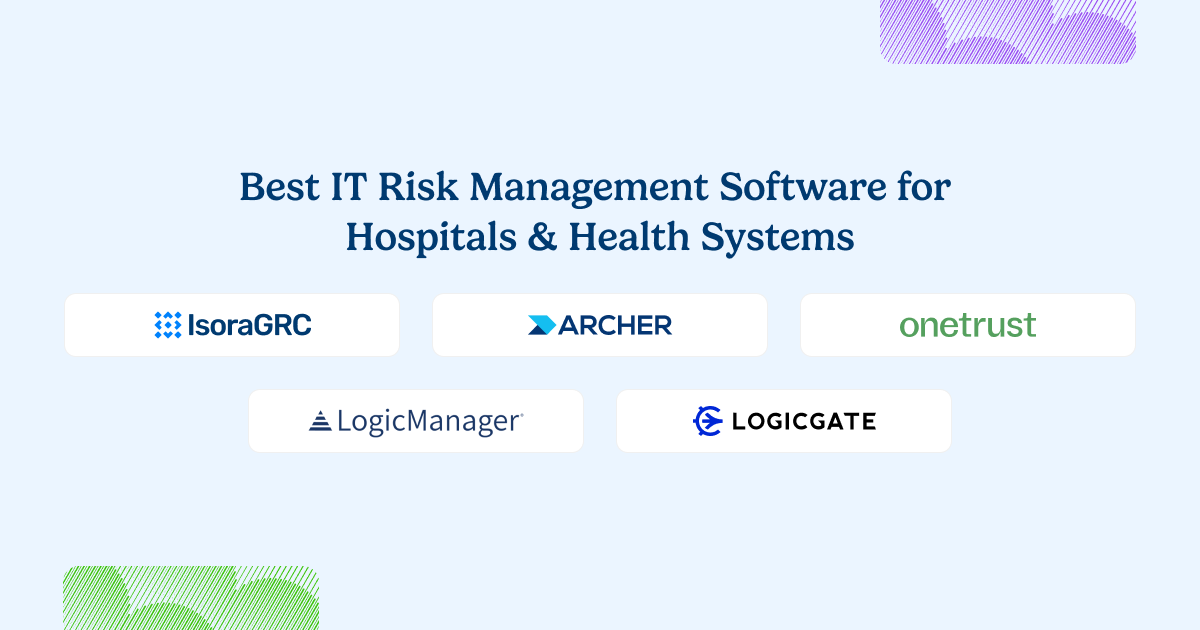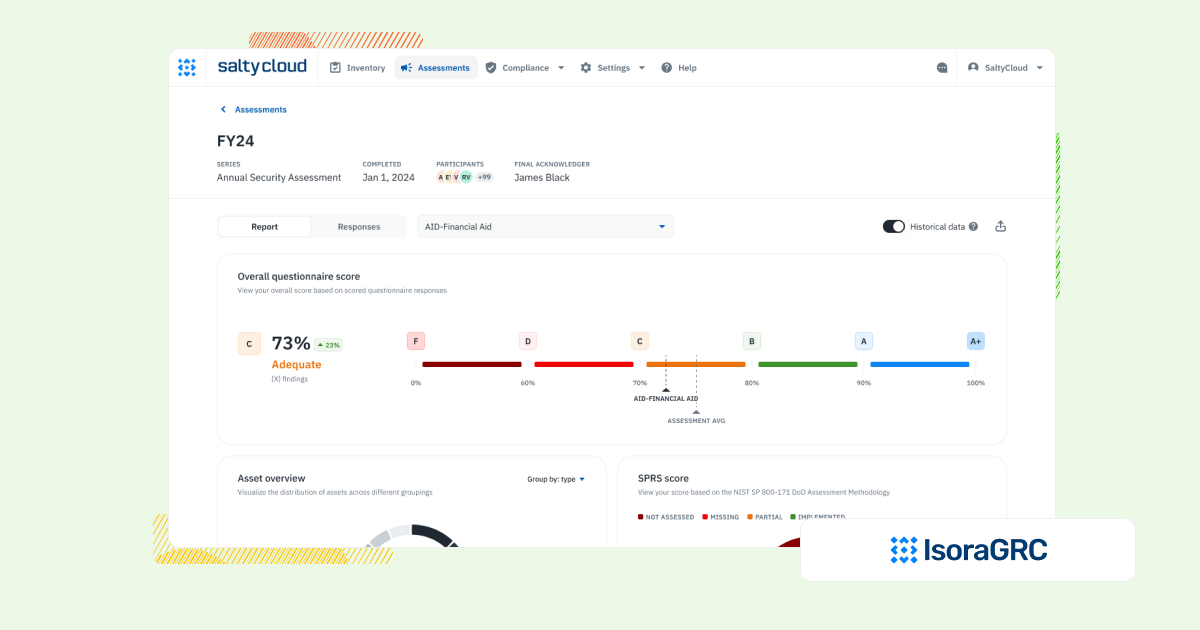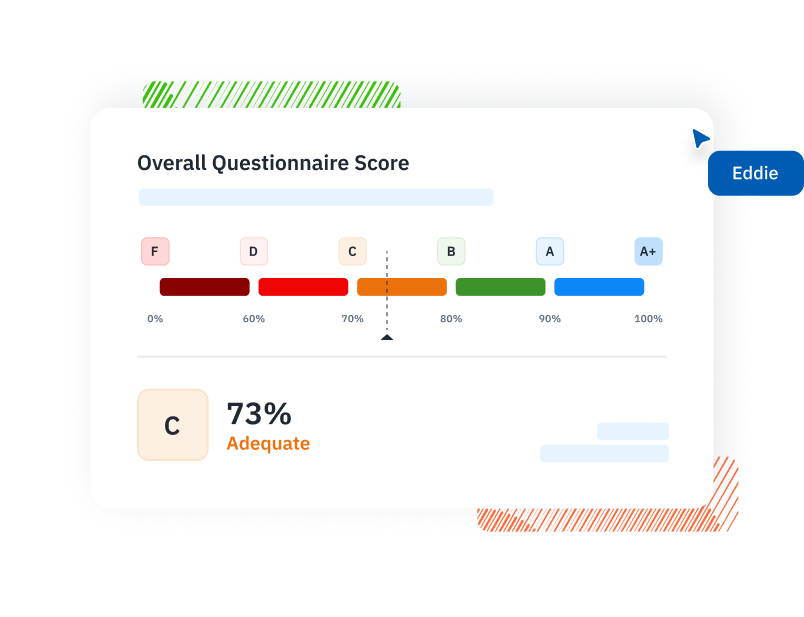
The stakes for managing IT and cybersecurity risk in healthcare have never been higher. Between the HIPAA Security Rule, OCR audits, HITRUST CSF requirements, and increasing ransomware threats targeting medical systems, hospitals and health systems need more than spreadsheets and audits—they need tools that support real, repeatable security workflows.
Whether you’re conducting security risk assessments, managing IT asset inventories, or preparing for OCR audits, the right IT risk and compliance software can help you streamline processes, stay aligned with frameworks like NIST 800-53 and HITRUST CSF, and engage both clinical and IT teams in meaningful ways.
In this guide, we’ve selected the best IT risk management software for healthcare organizations, especially those running complex hospital systems, based on real-world workflows, industry compliance needs, and team adoption across departments.
What to Look For in an IT Risk Management Tool for Healthcare Organizations
| Workflow Capability | Why It Matters for Hospitals & Health Systems |
| Assessment Management | Streamlines security risk assessments required for compliance with HIPAA Security Rule, NIST 800-53, and HITRUST CSF, critical for regulatory adherence and audit readiness. |
| Questionnaire Delivery & Completion | Automates the distribution and tracking of security questionnaires for diverse business units and third-party vendors, essential in hospital IT risk management. |
| Inventory Tracking | Provides centralized inventory management for critical IT systems, clinical applications, medical devices, and third-party vendors, improving risk oversight and cybersecurity compliance. |
| Risk Register & Exception Management | Enables systematic tracking, documentation, and resolution of identified IT and cybersecurity risks, vital for continuous compliance with healthcare regulations. |
| Scoring, Reporting & Risk Visualization | Delivers clear risk reporting and compliance dashboards tailored for healthcare regulatory audits (OCR, HIPAA, HITRUST), simplifying internal and external review processes. |
| Collaboration & User Experience | Ensures intuitive user experience for clinical, IT, and administrative teams, supporting comprehensive adoption and effective risk management across the health system. |
| Implementation & Setup | Rapidly deployable without significant IT overhead or external consultants, enabling hospitals and healthcare organizations to establish compliance workflows and risk management programs quickly. |
Top 5 IT Risk Management Platforms for Hospitals & Health Systems
1. Isora GRC

| Category | Details |
| Best For | Hospital and health system security teams needing a collaborative, HIPAA-aligned IT risk management solution. |
| Overview | Isora GRC is a collaborative IT GRC tool designed for healthcare organizations managing risk across clinical, operational, and vendor systems. It supports end-to-end workflows including security assessments, IT asset evaluations, exception management, and compliance reporting—all without complex setup. |
| Strengths | ✅ Built-in support for HIPAA Security Rule and NIST 800-53 workflows
✅ Collaborative risk register ✅ Easy adoption across teams ✅ Trusted by healthcare systems and regulated research institutions |
| Limitations | ⚠️ Not designed for broad enterprise GRC outside of IT/security, also referred to as integrated risk management (IRM)
⚠️ Lighter on legal or audit-only features |
| When to Consider | If your health system needs a very detailed setup and you’re okay with a long, expensive rollout process. |

2. Archer IRM
| Category | Details |
| Best For | Large healthcare organizations that need detailed, custom risk tracking and have the staff to manage a complex system. |
| Overview | Archer IRM is a powerful but complicated GRC tool often used in government or financial sectors. It can be set up to manage hospital risks, but it usually takes a long time to get going and needs outside help. |
| Strengths | ✅ Strong reporting and workflow tools for tracking enterprise risk
✅ Can be customized to fit very specific use cases |
| Limitations | ⚠️ Hard to use without consultants or dedicated IT support
⚠️ Designed more for auditors than everyday IT/security staff |
| When to Consider | If your health system needs a very detailed setup and you’re okay with a long, expensive rollout process. |
| Other Comparisons | Archer IRM vs ServiceNow GRC vs Isora GRC
LogicGate vs Archer IRM vs Isora GRC ZenGRC vs Archer IRM vs Isora GRC |
3. OneTrust
| Category | Details |
| Best For | Hospitals focused on privacy, data sharing, and vendor risk management, not deep IT security workflows. |
| Overview | OneTrust covers many compliance needs, from HIPAA privacy to sustainability. It has tools for assessments and vendor risk, but IT and security teams often find it hard to tailor it for risk management or daily hospital workflows. |
| Strengths | ✅ Strong in privacy laws and third-party compliance
✅ Covers a lot of regulations in one place |
| Limitations | ⚠️ Risk assessments and forms are hard to customize
⚠️ Learning curve is steep, especially for non-technical teams |
| When to Consider | If your team mainly needs privacy and vendor oversight, and you can manage slower, less flexible risk workflows. |
| Other Comparisons | OneTrust vs ServiceNow GRC vs Isora GRC |
4. LogicManager
| Category | Details |
| Best For | Small to mid-sized hospital teams looking for a straightforward starting point in risk and compliance management. |
| Overview | LogicManager offers simple tools to start tracking hospital risk, with strong customer service. It works well for teams that don’t need complex features, but may feel too limited for growing health systems. |
| Strengths | ✅ Easy to get started with and well-supported
✅ Prebuilt forms and templates save time early on |
| Limitations | ⚠️ Lacks depth for complex IT risk or clinical system workflows
⚠️ Doesn’t scale well across larger or more technical teams |
| When to Consider | If your hospital is just starting with risk tools and doesn’t yet need full-scale IT risk or vendor tracking capabilities. |
| Other Comparisons | Quantivate vs LogicManager vs Isora GRC |
5. LogicGate
| Category | Details |
| Best For | Health systems with experienced IT or security staff who want full control over building and managing their risk workflows. |
| Overview | LogicGate lets hospitals and health systems build their own risk and compliance workflows using a drag-and-drop interface. It offers lots of flexibility, but takes time to learn and set up, especially for healthcare teams juggling clinical systems, IT, and vendors. |
| Strengths | ✅ Highly customizable, visual workflow builder
✅ Can grow and change with your risk program |
| Limitations | ⚠️ Takes time to learn and configure properly
⚠️ Collaboration features can feel clunky for larger teams or shared workflows |
| When to Consider | If you want to design your processes and have the resources to manage setup and ongoing updates internally. |
| Other Comparisons | LogicGate vs Archer IRM vs Isora GRC |
What Our Customers Say About Isora GRC
Security teams at top institutions are using Isora GRC to replace legacy tools and manual processes with intuitive workflows and actionable insight.
“Moving from manual processes to using Isora was a breath of fresh air. What used to take months is now automated, reliable, and defensible. Isora saves us significant time while delivering accurate insights that improve decision-making.”
Jessica Sandy, IT GRC Manager, The University of Chicago
“Isora has been essential in helping us meet our University of California cybersecurity requirements across a decentralized campus. Automating assessment data collection and reporting has given us clear visibility into unit-level risks, enabling us to prioritize resources effectively and address gaps with confidence.”
Allison Henry, CISO, The University of California, Berkeley
FAQs
What’s the best IT risk management software for HIPAA compliance in hospitals?
Top-rated platforms like Isora GRC support HIPAA Security Rule compliance by providing built-in tools for security risk assessments, automated workflows, exception tracking, and documentation for OCR audits. These features help hospitals meet regulatory standards efficiently and maintain continuous compliance.
How do hospitals manage security risk assessments for clinical systems and comply with HITRUST and NIST 800-53?
Healthcare-focused IT GRC platforms simplify risk assessments through prebuilt security questionnaire templates, automated response collection, and reporting aligned with frameworks like HITRUST CSF and NIST 800-53. These tools help hospitals assess internal systems and vendors, document compliance controls, and maintain readiness for audits.
What’s the difference between IT GRC tools and traditional cybersecurity software for healthcare organizations?
IT GRC tools manage governance, risk, and compliance workflows, such as assessments, IT asset inventories, third-party risk, and audit documentation. Cybersecurity software, by contrast, focuses on technical protections like threat detection, firewalls, and endpoint security.
How do hospitals manage IT asset inventories and use asset assessments to support cybersecurity compliance?
Effective IT risk platforms include asset inventory features that map ownership, track risk, and link systems to compliance requirements. Asset assessments of EMRs, patient portals, medical devices, and admin systems help identify vulnerabilities, support HIPAA/HITRUST compliance, and prepare for audits.
Why is third-party risk management critical for hospitals, and how do platforms support it?
Hospitals depend on external vendors for clinical software, IT systems, and medical equipment. GRC platforms support vendor risk assessments, remediation tracking, and documentation, helping hospitals safeguard patient data and ensure third-party compliance with standards like HIPAA and HITRUST.
What should healthcare IT teams look for in an IT risk and compliance platform?
The ideal platform supports security GRC workflows, is intuitive for non-technical users, automates compliance reporting, and aligns with HIPAA, NIST, ISO, and HITRUST frameworks. Built-in support for third-party risk management and continuous assessments is also essential.
This content is for informational purposes only and does not constitute legal or compliance advice. See our full disclaimer.


















